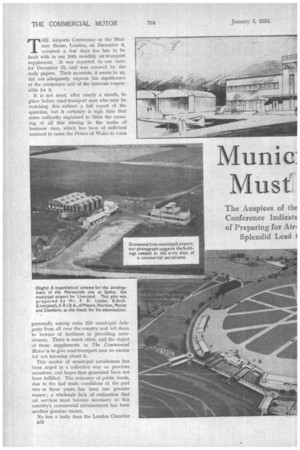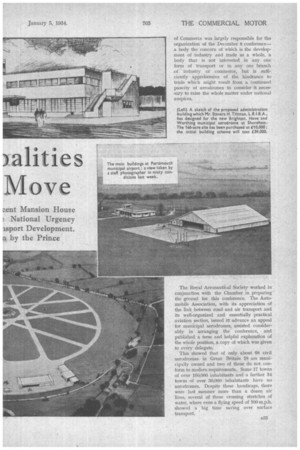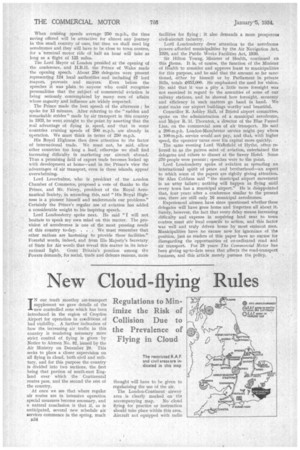Munk Must Move
Page 46

Page 47

Page 48

If you've noticed an error in this article please click here to report it so we can fix it.
THE Airports Conference at the Mansion House, London, on December 8, occurred a few days too late to be dealt with in our 10th monthly air-transport supplement. It was reported in our issue for December 15, and was covered by the daily papers. Their accounts, it seems to us, did not adequately express the significance of the conference and of the interests responsible for it.
It is not meet, after nearly a month, to place before road-transport men who may be watching this subject a full report of the speeches, but it certainly is high time that some authority explained to 'them the meaning of all this stirring in the ranks of business men, which has been of sufficient moment to cause the Prince of Wales to come
personally among some 250 municipal delegates from all over the country and tell them to beware of tardiness in providing aerodromes. There is much afoot, and the object of these supplements in The Commercial Motor is to give road-transport men no excuse for not knowing about. it.
This matter of municipal aerodromes has been urged in a collective way on previous occasions, and hopes then generated have not been fulfilled. The economy of public funds, due to the bad trade conditions of the past two or three years, has been one genuine reason ; a wholesale lack of realization that air services must become necessary to this country's commercial advancement has been another genuine reason.
No less a body than the London Chamber Ba2 of Commerce was largely responsible for the organization of the December 8 conference— a body the concern of which is the development of industry and trade as a whole, a body that is not interested in any one form of transport or in any one branch industry or commerce, but is sufficiently apprehensive of the hindrance to trade which might result from a continued paucity of aerodromes to consider it necessary to raise the whole matter under national auspices.
The Royal Aeronautical Society worked in conjunction with the Chamber in preparing
the ground for this conference. The Automobile Association, with its appreciation of the link between road and air transport and its well-organized and essentially practical aviation section, issued in advance an appeal for municipal aerodromes, assisted considerably in arranging the conference, and published a terse and helpful explanation of the whole position, a copy of which was given to every delegate.
This showed that of only about 68 civil aerodromes in Great Britain 18 are municipally owned and two of these do not conform to modern requirements. Some 17 towns of over 100,000 inhabitants and a further 34 towns of over 50,000 inhabitants have no aerodromes. Despite these handicaps, there were last summer more than a dozen air lines, several of these crossing stretches of water, where even a flying speed of 100 m.p.h. showed a big time saving over surface transport.
When cruising speeds average 250 m.p.h., the time saving offered will he attractive for almost any journey in this small country of ours, but then we shall need big aerodromes and they will have to be close to town centres, for a terminal motor ride of half an hour will take as long as a flight of 125 miles.
The Lord Mayor of London presided at the opening of the conference, and H.R.H. the Prince of Wales made the opening speech. About 250 delegates were present representing 124 local authorities and including 87 lord mayors, provosts and mayors. Even before the speeches it was plain to anyone who could recognize personalities that the subject of commercial aviation is being seriously contemplated by many men of affairs whose sagacity and influence are widely respected.
The Prince made the best speech of the afternoon ; he spoke for 13 minutes. After referring to the "sudden and remarkable strides" made by air transport in this country in 1933, he went straight to the point by asserting that the real advantage of flying is speed, and that in some countries cruising speeds of 200 m.p.h. are already in operation. We must think in terms of 250 m.p.h.
His Royal Highness then drew attention to the factor of international trade. We must not, he said, allow other countries too long a lead, otherwise we shall find increasing difficulty in marketing our aircraft abroad. Thus a promising field of export trade becomes locked up with development at home—and in the Prince's view the advantages of air transport, even in these islands, appear overwhelming.
Lord LeverhuIrne, who is president of the London Chamber of Commerce, proposed a vote of thanks to the Prince, and Mr. Fairey, president of the Royal Aeronautical Society, in seconding this, said "His Royal Highness is a pioneer himself and understands our problems." Certainly the Prince's regular use of aviation has added a considerable weight to his inspiring speech.
Lord Londonderry spoke next. He said "I will not hesitate to speak my own mind on this matter. The provision of aerodromes is one of the most pressing needs of this country to-day. . . We must remember that other nations are hastening to provide these facilities." Forceful words, indeed, and from His Majesty's Secretary of State for Air words that reveal this matter in its international light. Great Britain's position among tbe Powers demands, for social, trade and defence reasons, more facilities for flying ; it also demands a more prosperous civil-aircraft industry.
Loxid -Londonderry drew attention to the aerodrome powers afforded municipalities by the Air Navigation Act, 1020, and the Public Works Facilities Act, 1930. .
Sir Hilton Young, Minister of Health, continued on this dtheme. It is, of course, the function of the Minister of Health to consider and approve loans to municipalities for this purpose, and he said that the amount so far sanctioned, either by himself or by Parliament in private Bills, totals £653,000. He emphasized the need for vision: He said that it was a pity a little more foresight was not exercised in regard to the amenities of some of our railway stations, and he showed how foresight, economy and efficiency in such matters go hand in hand. We mist make our airport buildings worthy and beautiful.
Councillor R. Ashley Hall, of Bristol airport committee, spoke on the administration of a municipal aerodrome, and Major R. H. Thornton, a director of the Blue Funnel Line, on the commercial uses of air transport. He said a 200-m.p.h. London-Manchester service might •pay where a 100-m.p.h. service would not pay, and that, with higher speed, the operator turns over his capital more quickly. The same evening Lord Wakefield of Hythe, often referred to as the patron saint of aviation, entertained the delegates and others to dinner at the Savoy Hotel. Some 370 people were present ; speeches were to the point.
Lord Londonderry spoke of aviation as spreading an international spirit of peace and brotherhood—an aspect to which some of the papers are rightly giving attention. Sir Alan Cobham said "the municipal airport movement is an utter failure ; nothing will happen in flying until every town has a municipal airport." He is disappointed that, four years after a conference similar to the present one, there are still only 16 municipal aerodromes.
• Experienced airmen have since questioned whether these delegates will have gone home and forgotten all about it. Surely, however, the fact that every delay means increasing difficulty and expense in acquiring land near to town centres, must stir local councils to action, and this factor was well and truly driven home by most eminent men. Municipalities have no excuse now for ignorance of the position, just as readers of this paper have no excuse for disregarding the opportunities of co-ordinated road and air transport. For 28 years The Commercial Motor has been giving up-to-date news that affects the road-transport business, and this article merely pursues the policy.




























































































